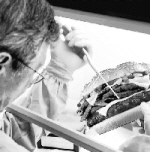



New Recipe For Sustainability: Stem-Cell Burgers
OTTAWA - "Fifty years hence, we shall escape the absurdity of growing a whole chicken in order to eat the breast or wing by growing these parts separately under a suitable medium." Winston Churchill.
Winston Churchill was correct, in his volume of essays entitled Thoughts and Adventures, to anticipate the manufacture of meat, first in the lab, then in vats. He was wrong in the time it would take to get industrial meat into mass production. We're still not quite there. It's going to take another five years or 10 years - depending on whether you're waiting for hamburger or steaks.
The science and the technology exist. Dutch scientist Henk Haagsman's research team at the University of Utrecht, supported by million-dollar grants from the Dutch government, manufactures a kind of ground pork from the stem cells of pigs. His assignment now is to determine whether the process will work on an industrial scale - with a conclusion due in 2009.
Professor Haagsman, one of the world's top authorities in "meat sciences," believes that the industrial production of meat will be possible and practical - believes, indeed, that he and his colleagues will have commercial products by 2012.
("We have no loin yet," he reports, "but we do have a minced pork.") The global market for ground meats is $150-billion (U.S.) a year.
You can look at Prof. Haagsman's research (and related research under way around the world) in a number of ways, all bewildering.
On the one hand, cultured meat heralds the end of the Age of the Abattoir and, with it, our apparent need to slaughter 40 billion animals a year. Civilized people must necessarily approve. On the other hand, cultured meat introduces another processed agri-food that severs humanity further from the natural world, increasing the sense that we are mere units of biomass, a sort of livestock ourselves.
Consumers will almost certainly accept cultured meat regardless of metaphysical reservations. Stem-cell hamburger will have no e-coli, no salmonella. It will have no fat - or only fat put there as an additive. Taste won't be much of a problem, since we'll probably have meat of many tastes, possibly including raisin-cranberry and tutti-frutti. (Meat has scarcely any taste now, for that matter, except from spices and filler used to mimic one.) And Prof. Haagsman says that cultured meat will taste the same as animal meat - because the protein content (which imparts taste) will be the same.








